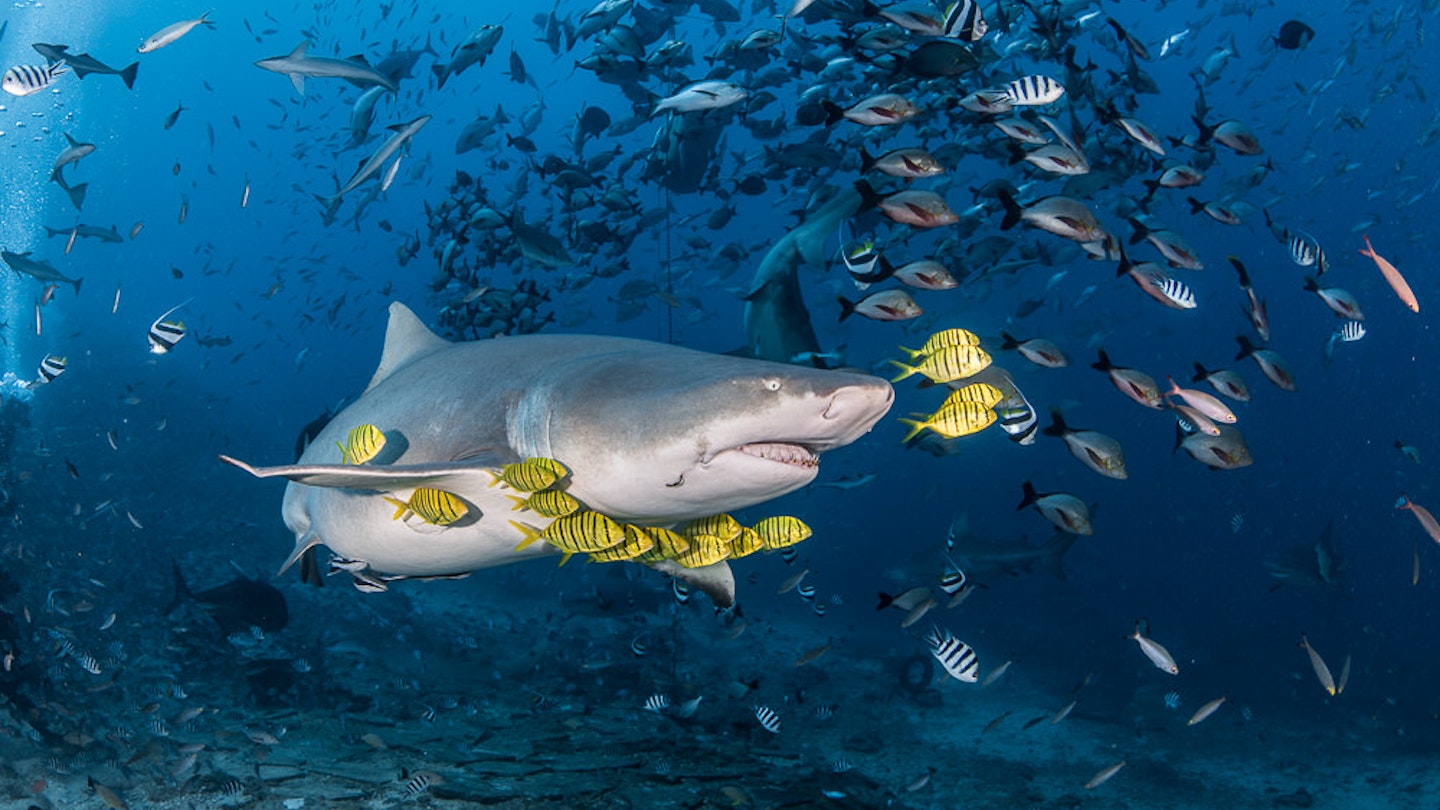Dive into Shark Adventures in Fiji’s Beqa Lagoon
A 3.5-metre shark careens toward a group of divers, its powerful, tiger-striped body guided by an upturned snout and two beady eyes. This isn’t an attack – the tiger shark is merely curious – but the divers’ adrenaline surges all the same as they sink behind the rock wall they’re grasping. The shark cruises over and circles back to join bull, black tip, nurse, and lemon sharks, along with tropical fish, in a controlled and awe-inspiring feeding frenzy.
Welcome to Fiji’s Beqa (Be-nga) Lagoon, where the boldest of divers hang out with some of the world’s largest and most-feared predators.
Fiji’s Shark Diving History
Superlative shark diving encounters are possible in Fiji’s Beqa Lagoon thanks to the locals, who have been swimming with sharks for around three thousand years. Shark-related stories and myths have been passed down through generations, and long before Christianity began to take hold, indigenous Fijians revered their very own shark god, Dakuwaqa, who was said to protect fishermen from dangers at sea.
Beqa Lagoon’s local shark wranglers accompany each dive boat to the feeding sites they’ve specially designed, acting as intermediaries beneath the sea, and ensuring the safety of both divers and sharks. By positioning themselves between the divers and the sharks, they use hand motions to signal where food is available and where the sharks are not welcome. Although the sharks generally heed these signals, those that don’t may receive manual redirection as a last resort, minimizing accidental collisions with divers.
Diving Beqa Lagoon
There are eight species of shark present in Beqa Lagoon, all of which frequent the feeding sites. However, most divers show up primarily for a chance to encounter the notoriously feisty tiger and bull sharks.
Featuring distinctive vertical stripes and weighing up to 635kg, tiger sharks have a woefully undiscerning palate and eat virtually anything. While humans aren’t officially part of their diet, they aren’t complete strangers to the insides of tiger shark stomachs. Conversely, bull sharks are smaller, reaching only up to 230kg but are often considered more dangerous to humans due to their tendency to inhabit shallow, warm areas alongside freshwater rivers and tributaries.
While both of these species can be found at any of the feeding sites around the lagoon, the tiger sharks seem especially attracted to Cathedral, a site designed and maintained by Beqa Lagoon Resort. Located just a short boat ride from the resort and 20 metres below the surface, divers descend along the contour of a reef and settle behind a rock wall at the bottom. Here, thousands of fish, including schools of giant trevally, fusiliers, and triggerfish congregate alongside plenty of sharks for feeding.
Responsible Shark Diving
To some, feeding sharks near humans seems risky. A primary concern is the potential for sharks to associate humans with food, which could lead to behavior changes and difficulties finding natural food sources. However, recent studies reveal that sharks in the Beqa Lagoon are not permanent residents, and feeding does not significantly alter their movements. When humans arrive without food, sharks simply leave.
Moreover, during feeding sessions, there are strict rules to protect both divers and sharks: don’t touch the sharks, don’t swim away from the wall before feeding concludes, and wear wetsuits that cover arms and legs. When these rules are followed, shark diving constitutes a relatively safe and responsible activity, crucial to conserving the underwater environment.
Established in partnership with local villages in 2004, Beqa Lagoon’s Shark Reef Marine Reserve aims to conserve and study sharks, marking a first-of-its-kind initiative in Fiji. In exchange for a share of the shark diving tourism revenues, locals have committed to halting fishing in the reserve, allowing coral communities to thrive and significantly enhancing fish yields in neighboring regions. Dive boats also support scientific research, improving understanding of shark behavior.
Where to Stay Near the Sharks
Tiger shark enthusiasts often choose Beqa Lagoon Resort, a laid-back accommodation near several local villages on Beqa Island, an hour-long boat ride south of Pacific Harbour. For those who enjoy luxury with their extreme adventure, Nanuku, a stunning Auberge property just west of Pacific Harbour, offers unique cultural experiences such as kava ceremonies and fire-walking. Travelers on a tighter budget will find great options at Waidroka Bay Resort, a secluded and tidy establishment on Viti Levu’s southern shore, with daily yoga and excellent paddleboarding opportunities.





